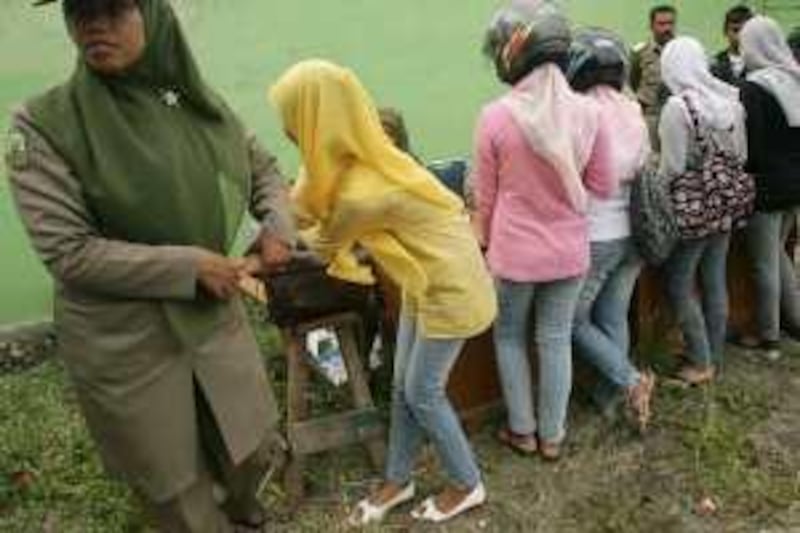BANDA ACEH, INDONESIA // The girls are outmanoeuvered. Out of nowhere, a group of policewomen in olive-green uniforms, swoop in and flag down their motorcycle. "Where are you going?" one asks, inspecting their identity cards. "To the university," the girls reply demurely. "Dressed like that?" she thunders. "That's not how a Muslim should dress. If you wear clothes like that, you will burn in hell!"
There is a deer-in-the-headlights moment. The girls, both teenagers, freeze in shamefaced silence. Both of them are wearing headscarves and dressed in nothing skimpy. But they still flout Aceh's dress code: both are wearing skin-tight, hip-hugging jeans, a big taboo in the eyes of Aceh's Sharia police. Since 2005, the police have patrolled the streets of Aceh, the northernmost province of the Indonesian archipelago, to chase down boys and girls dressed inappropriately, to chide men for cavorting with unrelated women in public and arrest those who drink alcohol or gamble.
But the province has recently stepped up its efforts to enshrine Islamic morality and, in September, the provincial government passed a controversial law which mandates that Muslims caught committing adultery should be stoned to death. The law goes further to outlaw homosexuality and refuses to deem marital rape a crime. The law, which sparked outrage from human rights groups, provoked comparisons with countries such as Somalia and Nigeria.
Indonesia, the world's most populous Muslim-majority nation, has been well-known for its more moderate brand of Islam. Islamist parties were trounced in this year's national elections, suggesting that a majority of Indonesians do not support a hard-lined interpretation of Islam. However, in recent years, as part of a decentralisation of power away from the capital, more than half of Indonesia's provinces have passed Sharia-based laws regarding conduct and dress, but none have gone as far as Aceh.
Whether stoning will be enforced in the province, which has only recently emerged from a decades long civil conflict, is questionable. While most parliamentarians voted in favour of the law there is no agreement on the actual implementation of it. "The truth can only be told in the shadows," said Mr Kamaruddin Abu Bakar, the deputy head of Party Aceh, a political party set up by former rebels. "This is a very delicate subject." He said stoning was impractical to implement, but was non-committal about repealing the law. Even when it comes to canings for those caught in indecent dress, there is some room for concessions.
At the moment, violators are only offered Islamic "guidance". In some instances, they are summoned to Aceh's Grand Mosque for a public chastisement. However, from January 1, women in the district of West Aceh will be banned from wearing trousers. Women caught in breach will have their trousers torn up and they will be forced to wear "loose fitting" attire. Ramli Mansur, the district chief of West Aceh, has already placed an order for 14,000 long skirts, and sent a stern edict to schools and colleges warning against violating the law.
"This is a very primitive way of thinking," said Liani, a 23-year-old university student in Banda Aceh. "To wear or not wear jeans or jilbab is a decision that should come from the heart. Heaven and hell are not geographical places." But Aceh's Dinas Syariat Islam, or provincial Sharia office, says the limited sartorial freedoms are for women's own good. "It will reduce crime," said Ayub Ahmad, the secretary of Dinas Syariat Islam, who went on to explain: "Bill Clinton decided to have an affair with Monica Lewinsky only after he saw her in seductive dresses."
"There is no clash between modernity and Islam," said Marzuki Abdullah, a stout man with a bottlebrush moustache who is the commander of the 1,500-strong Sharia police force. "Religion is the primary need of Acehnese people." "But we are not like the Taliban," he said, explaining that stoning is the last resort. It is not just women, men too must adhere to the dress code. Recently, male and female officers from the Sharia policefanned out on both sides of a busy arterial road leading up to Banda Aceh's airport. Mr Abdullah, who trailed the convoy in his SUV, stood nearby, inspecting his troops from a distance.
A while later, they hauled over a boy dressed in Bermuda shorts. Mr Abdullah, his arms behind his back, turned his stony gaze towards him. "Do you think you are a good Muslim?" he asked. "Do you know the meaning of a good Muslim?" The boy nodded and bowed his head. "Then why are you dressed like a Kafir?" Mr Abdullah roared. There was no answer. The boy was let off after another mild chiding by a supervising officer. "We won't be lenient with you next time," Mr Abdullah warned.
* The National





